Match Our Mountains
This keynote was given at the Theatre Bay Area Conference on April 3, 2016. The following presentation represents my beliefs as a private citizen and not as a representative of any organization with which I am affiliated.
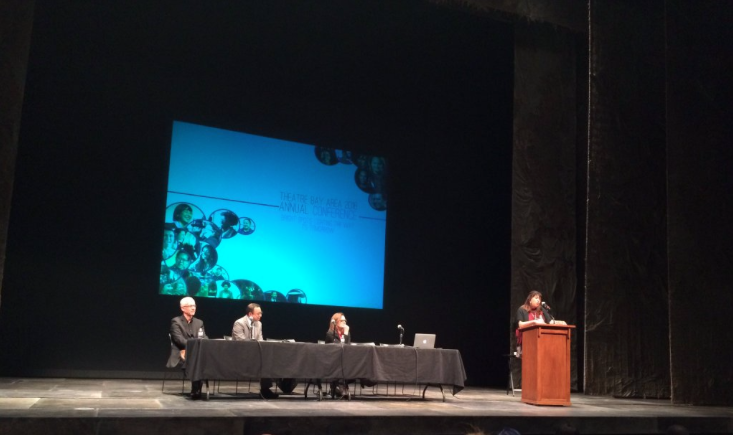
Let’s start with some questions:
Who’s an artist? Presenter? Administrator?
Who works in the East Bay? Who works in San Francisco and above?
Who works in an urban center? Anyone rural?
Who comes from a home where your parents were immigrants from another country?
Who has been out of the country in the last five years? The last year? The last six months? To Europe? Latin America? Asia?
Who has eaten in a restaurant in your city where the owner speaks another language other than English?
It seems to be the norm and yet most of us don’t cross the unspoken border to another part of our city that is unlike the one we live in…Today we are at a gathering where people are of like mind, where we grapple with the continuation of our success, the solving of our challenges and the addressing of changes that affect our future. Meanwhile, modes of creating content are changing and the content creators are challenging us by making us question if our theatres are the best place for the distribution of stories. And most important, the face of creators are rapidly changing.
But in the midst of the chaos that is the world that we live in today, I have been moved by simplicity and healing. A conductor in the middle of Bagdad playing his cello after an airstrike. A documentary filmmaker shoots a real moment when a mother and daughter separated for six years cry as they reach out to each other through breaks in the border, unable to fully embrace because of the wall that divides them.
All are striving for connection, beauty, calm, and refinement in a world where there is fear, confusion, ugliness, acts of terror, inequality, violence, and hate. All are on their path to art; they find that their better selves have the power to heal a broken spirit, to heal so many of us who have lost our way.
A returning soldier makes a clay sculpture and heals himself just from the quiet he inhabits, while he creates and lets his pain explode through his art. We understand this because he speaks for us too. A young man recovering from a stroke stands up from his wheelchair, and tells us his life has been changed because of the stories he was encouraged to write after four years of self-imposed exile.
All are striving for connection, beauty, calm, and refinement in a world where there is fear, confusion, ugliness, acts of terror, inequality, violence, and hate. All are on their path to art; they find that their better selves have the power to heal a broken spirit, to heal so many of us who have lost our way.
The world is not easy, but I find great comfort in knowing that my life’s work, our life’s work is the core of civility. And I want more. I yearn for more in times like these. And when I find evidence of this spirit it moves me like the mountains that surround us.
Have you looked where we are today between the mountains and the sea? California is perched on the precipice of the Pacific where the West faces the East. The majesty of the mountains, the mystery of the sea, and the hope emanating from the belief that democracy is a place where all stories are told. The profundity of this possibility speaks to our better selves.
I was in Lausanne, Switzerland, last year. Right in front of Lake Geneva is a theatre I visited called Theatre Vidy run by Vincent Baudriller, who ran the international theatre festival in Avignon for ten years. He invited me to come to his festival and I went because there were artists I had never seen before. People like Romeo Castellucci the foremost avant-garde director in Europe. Or the theatrical priestess, Angelica Liddell, from Madrid who writes, directs designs the sets, costumes, and performs. A sorceress. And when you run backstage immediately after the curtain is down, she’s disappeared: run out the theatre’s backdoor. A mysterious and evasive talent.
There were people from all over: Fulana from Germany and Tal y Tal from Brussels, and on and on, and every time they introduced me: I was Diane Rodriguez from California, Los Angeles—as if it was its own country. Not the United States, but California, Los Angeles.
Los Angeles whose front door is the Pacific, perched at the edge of the continent. The future at its doorstep. As Carey McWilliams, the quintessential California writer noted, “it is the last frontier of Western Civilization, a land where the West faces the East.” A place of big ideas and experimentation. James Bryce, former English Ambassador to the US, observed: “It has more than any other the character of a great country, capable of standing alone in the world.” And so it does. We are a country, state, and dreamland all wrapped up into one. What a legacy for us to follow.
I was born in California. Who else was born in California? Who makes California their home? When I feel bottled up, I take in the rolling hills, the majestic oaks, the miles of beaches, the crazy experimenters, the risk takers, the artists, the scientists, the teachers, the writers, the architects, the speakers of many languages that people the state. And it all fills my soul. The power and grace of this land deserves a powerful and conscious people to inhabit it.
There is this quote in Sacramento on the capitol building. And whenever I read it I picture the lovely and flirtatious California beckoning for one of us to capture her heart. And the quote is: “Bring me a man to match my mountains.” Hmm, I feel left out of the equation. Bring me a man to match my mountains? Suddenly, California talks to me: OK. OK. OK. How about: bring me people to match my mountains?
Better. But California, dear lady, how do I match a mountain? Do I puff myself up to think I am as grand? Do I claim I am as beautiful as a natural wonder, or as profoundly steadfast as the Sierra Madres? And she answers: It’s a state of mind. You become a mountain when you are able to view what’s beyond it, creative enough to sustain a life well led, generous enough to protect those around you from the harsh winds that it breaks. Match a mountain. Able to view what’s beyond is vision and vision is leadership.
So let’s lead, California. Let’s look beyond our borders to find work and share work. Let’s look at aesthetics. Let’s think of big ideas to make our work at the center of our civil society.
For many years I considered my greatest strength and contribution the fact that I was an outsider working on the inside. I liked not being part of the status quo. I basked in it. And then I became chair of the TCG board. The White House called one day in May of 2014 when I was writing a new play in New Harmony, Indiana. They called with the idea of a nomination from President Obama to the National Council on the Arts.
It took nearly two years to be vetted, nominated, confirmed, and then appointed. The years as an outsider came to an end when that appointment was announced in January of this year. I have to admit I kinda mourned the loss. It’s cool being a renegade. Under the radar. It was comfortable. And you know, it’s easier being comfortable than having to actually reframe who I am, right? Change is hard.
Marci McMahon recently sent me her book Gender, Nation, and Self-Fashioning in US Mexicana and Chicana Literature and Art. She outlines two interesting concepts, one called redirection and the other disidentification. Disidentification is interesting because someone identifies you in one way, but you reject that identification and identify yourself in a new, different way. I took my power back by disidentifying with the image Hollywood gave me. I was an actress for years. I played many stereotypes in an effort to make a living. So, I reidentified myself in the image of my own making. This is within our power: to remake, redirect ourselves and our organizations. Open your doors to that power.
I met a woman from France at the festival in Switzerland who is from the Office National de Diffusion Artistique (ONDA), or the National Office for Artistic Distribution. She is responsible for dispersing art made in France to other parts of the world. What a concept, and now of course this is changing. Many conservative governments want to move to the American model of patrons, and less government support of looking in and out. But for now, Millica Illic from ONDA looks at me in complete bewilderment and astonishment mixed with curiosity and asks, “Why are you here?” Not because I didn’t belong there, but because so few US citizens make their way to a festival such as this. Not to say that we don’t have brigades going to different countries seeing work, not to say that we don’t have US presenters scouting at international festivals, and that we have US artists making their way out to perform on international stages. We have some of this sure, but certainly nowhere near the amount that other countries export.
Not a priority, why? Could it be the lack of a robust US funding source, which makes it near impossible for US artists to travel? Could it be aesthetics? We are so focused on the well-made play instead of experiences in the theatre that are not dependent on the word. Or does it need more focus and partnerships to look out?
I was in Santiago, Chile, in January of 2015. It was summer and it’s far. Third world it is not. Santiago has the most multi-national corporate headquarters in all of Latin America, it’s as safe as Manhattan with the highest skyscraper in South America. Theatres everywhere—beautiful state-of-the-art venues, some cool and some funky, but all crowded.
The crowd of arts professionals that attended that year was more diverse than those who attended Lausanne—there were Koreans, South Africans, and Estonians. We took a small delegation from TCG of about fifteen people. And you could clearly see that everyone had been attending this festival for years, making deals, and trading— truly an international marketplace, and we were nowhere in the mix. Not in 2015. And there wasn’t one show from the United States.
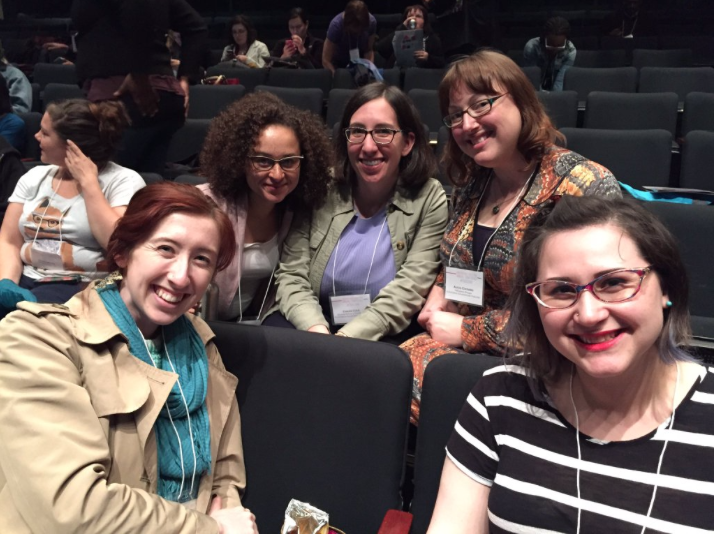
We go again this year in 2016. Attendance more than doubled from the US. And now there is one American company, Elevator Repair Service, performing in the festival. It takes heroic efforts and focus, and leading the charge are the NEA and TCG and you will be hearing about those efforts today. Nevertheless, there is an attitudinal shift that needs to take place throughout our field leadership about our place in an ever-increasing global world.
I come back from Santiago and I’m driving down a street, which will remain nameless because I don’t want you to guess what theatre I’m talking about, and I see this building that is so run down. I think, “Wow that place needs an overhaul, it’s so shabby!” It turns out to be one of Los Angeles’ preeminent theatre companies, and it looks like shabby chic gone horrendously array.
I’ve just been to Santiago and the theatre spaces are so well taken care of—they are valued. And here in my hometown, where actors don’t get paid by choice, theatres are blighted. We need to put value on our work. It is that simple. Meanwhile, US artists must be the most educated on earth: Julliard, ACT, Carnegie Mellon, Cal Arts, Yale, and the list goes on. Are we making a place for them to be valued and paid for their life’s work? I think not.
Certainly, we can say it’s too expensive to go or to send our work out when we can’t even afford to pay actors. Certainly, we can say that new work from demographics that we rarely produce is a financial risk, an unknown. Certainly, we can say, if we’re from a community of color in the United States that we shouldn’t be encouraging programmers to present international work when they aren’t even presenting our work. Certainly, if we’re doing ensemble-generated or devised work, but LORT theatres who have the most resources aren’t doing this work, why would we encourage them to present work from abroad? And on and on, and on and on. Plenty of excuses for a broken system.
As Vincent Baudriller from Theatre Vidy was quoted saying years back: “Culture has to remain outside the realm of capitalism; it should not be subjected to market forces. That is the only way to protect cultural identity.”
Reaching into history—few people know that El Teatro Campesino, the seminal California theatre company that came out of the grape strike of the fields of Delano, was a world-class touring company. I know. I was a member of that company during these years. And what it did, touring months on end in Europe, was stamp my passport as a global citizen. You realize that there are many centers of the world. Many divergent opinions. Many styles. Many aesthetics. The United States is only one center. And many times in today’s world, we do not lead.
I’m an actor and most of my career I didn’t play leads. I was part of an ensemble. We created together. It was a less patriarchal way of looking at, and creating new work for the stage. We drove these Dodge vans all through the US when we’d tour. They were blue and yellow, and they were huge, and I learned how to drive them and lead our caravan. It trained me to make sure that people were following me by always looking through my rear view mirror to see if they made that light, or were still behind me. And it also trained me to be a good follower, which is just as hard and just as important. Leader or follower, you are arriving at the same place.
All this to say, cross borders to find work. You can find it next door, in a community you never visit seven miles away, or in a country thousands of miles away—international and intercommunity. Otherwise, the world will be trading with each other, and we will sit in our air-conditioned bubble afraid to open up to the changes that come from the mix of human energy, a riotous blossoming of new ideas that come from the el otro.
I want to be moved, to see beauty, to be shocked, and to think. Bring me work that makes magic out of nothing. I live in California on the Pacific Rim, near Latin America on the West. Bring me work from there and from the communities that live here.
Let’s become activist artists who recognize that there are many centers and many ways of making work. Do work from a new canon and people will come. How many more productions of Shakespeare do we really need to see? I know Will would agree with me. We love us some good Shakespeare but you know, I just produced Kinan Valdez’s Popul Vuh, a creation myth from the Americas that he adapted. Fifty TCG staff members worked on the two-year effort. Fifty cast members from Boyle Heights. Ten professional musicians with an affiliation to our focus community and nearly 1,700 audience members of all colors came and found it spoke to them. And this is a Mayan myth. But the serpents connected to the Chinese, the drums to the African, the grandfather and grandmother to the First Nations, and the dance formations to the Celtic symbol of the spiral. What a revelation. Next time we do this, let’s mix the cast up to be multi-colored because this piece from indigenous America speaks to us all.
Give me another aesthetic. Yes, the well-made play is the anchor of our seasons, but I don’t care if it’s not literature all the time. I want to be moved, to see beauty, to be shocked, and to think. Bring me work that makes magic out of nothing. I live in California on the Pacific Rim, near Latin America on the West. Bring me work from there and from the communities that live here. And behind the choice, will be a good leader.
Our success is not our birthright. We’ve got to earn it, right? Carl Guardino’s editorial in the San Jose Mercury noted Silicon Valley’s success as the epicenter of the earth’s innovation: “To retain our leadership we will continue to measure ourselves to competition around the world.” To me this means, we understand our place in the global market.
Look at the film business. Business models are changing. It’s a time of disruption. There is the democratization of content creation. And if the film business doesn’t change, it will go the way of the music business. As a theatre field how are we responding to this change when we are strapped by the architecture of our theatres and the models of garnering audience loyalty? Does the way we distribute content also have to change because our artists are making work in different ways?
Inclusivity for me also refers to aesthetics. Let me borrow Shonda Rhimes word for inclusivity, and that word is “normalizing.” She’s making TV look like the world looks. When I say open the doors, I’m saying normalize what and who we see in the work that you make, and the work you present. In other words, inclusivity for me also encompasses aesthetics. If you don’t like what you see, write to the artistic director. You have more power than you think. We need to hear from you. Change is not made in a vacuum.
Normalizing shouldn’t be a risk, it’s a smart business choice. Though I lament that business is even a factor when I talk about art, it is a reality and I know that and this will pay off. Open up your doors. Have you seen the border between Tijuana and San Diego? I mean the border as edifice. It’s a giant Trumpian structure that is fifteen feet high that extends into the ocean. It’s a huge mass that stops, that stops thinking, ideas, energy, and flow.
At Friendship Park in Tijuana, where the border becomes a wall that you can see through, families from both sides of the border come to visit each other on Sundays, bringing lawn chairs to visit and touch fingertips. It is heartbreaking. And we let it happen. Reach over, invite, embrace those around us through art-making. Inter-community, international, inter-disciplines.
Let’s talk about leadership. Because if your leader doesn’t even want to open a window, it ain’t happening. You’re going to smother. I work at the Music Center. Buffy Chandler’s dream of building a Lincoln Center West was realized when she, through her grit and big idea, built this palace to the fine arts. I am one of the few women of color in a leadership position there. I’m surrounded by experts in the field. These jobs are lifetime achievement jobs and few people move out of them. If you are in one of these positions, I don’t blame you for staying, but please mentor. And those of you in the wings, know all the lines and the blocking, and get ready to act and be the part.
As Taylor Mac might say: “I’m not one of those whose been waiting in the wings. No, honey, I don’t do understudies.” I’ve fought the fight. I’ve stayed in the game. And it’s been fun and hard and sleepless. I haven’t left because I didn’t get my way. I’ve stayed in there and made in-roads for artists of all colors. I’ve turned noes into yeses. At the beginning, I’d find front doors shut and found side doors open. And then I’d hold them open. Now, I stand at the front door, opening it wide.
California—the place of big ideas. Big ideas are not without flaws, but we have to keep producing them. Like Buffy Chandler building her dream, Herst publishing, and Huntington and Stanford laying rail to connect East and West. Steve Jobs biting the apple and sharing it with all of us. Cesar Chavez starting a union. The Black Panthers food program that still exists today. Mario Savio and the student movement. Frederick Low founding the UC system. The California missions—most of which are still standing.
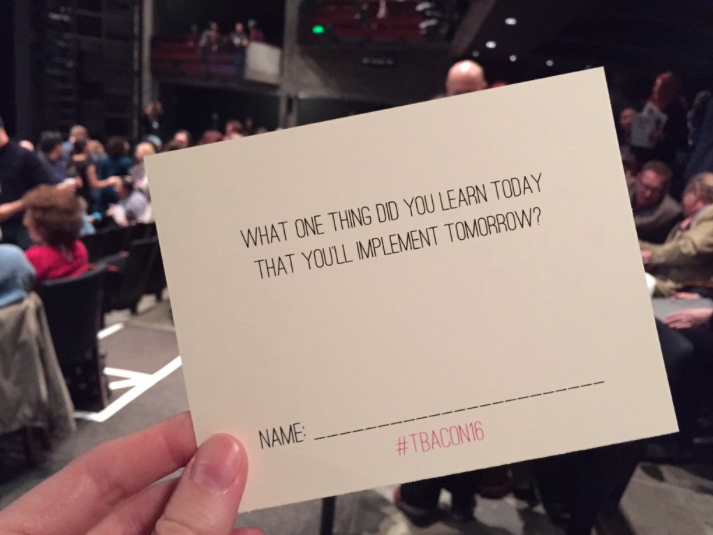
Google, Facebook, Uber, Twitter, and Jerry Brown are pushing the bullet train. What’s our big arts idea? Let’s shake things up. Shall we partner with the bullet rail agency and establish along its route a touring circuit for local, national, and international artists? Artists need only to hop a train to the next gig. Freight is sent right along. Presenters share in the expense. The center of this great state gets some love. And the bullet train makes us a deal. We tap into the deep energy of the San Andreas fault that runs parallel to the route.
Do we take our warriors—who have come back from battle, damaged, and then healed by art—and let them be our testifiers? Start a movement across the country. Take the willing to Congress. Art warriors: Let them speak and tell it like it is. Art is not a girlie past time, but a powerful mode to rest the savageness that has grasped us today. Please let’s do something. At least open a window. That’s right, we open windows. Sometimes we open a door. Let the air come in. Hopefully there is a breeze. And if we are by the Pacific, that sea breeze is irresistible. The salt water, the mist cools. The waves lull. Or if you’re in the burbs you hear the birds chirping as if they’re at a party drinking cocktails having a grand time until closing. In the city, there can be the low hum of the freeway in the distance, the early morning trucks beeping as they climb up the hills picking up our refuse—taking it away to a land unseen.
Windows open, doors open to bring in the outside. Stir things up. Move things around. We sit and let the breeze—the new energy surrounds us in this state they call the island of the land. And suddenly we hear the coming footsteps of the muse and she brings us a new idea that changes us. Let’s be open to that change. Onward.

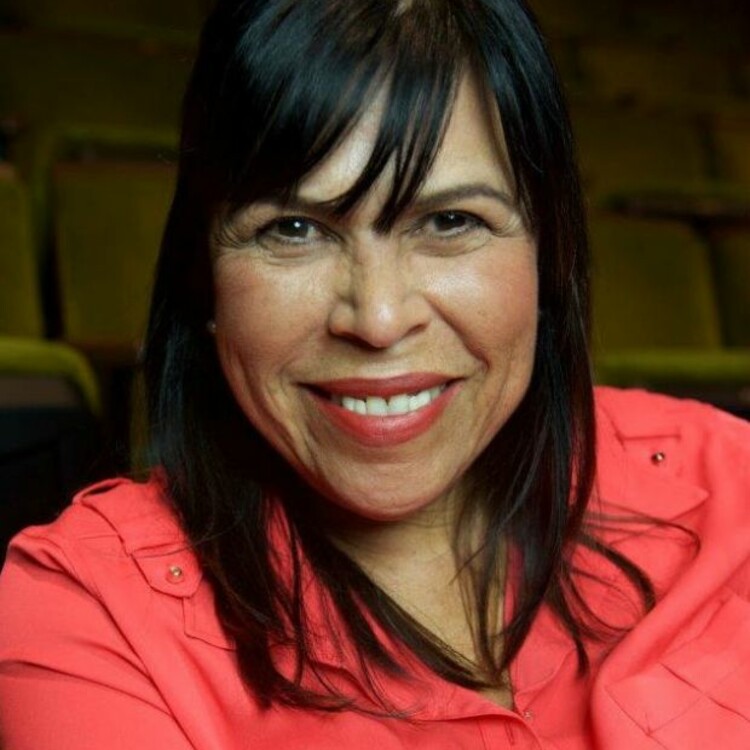
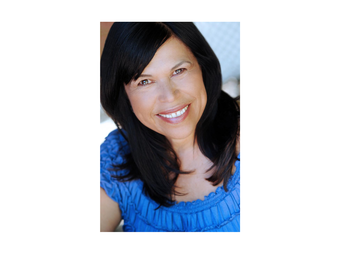


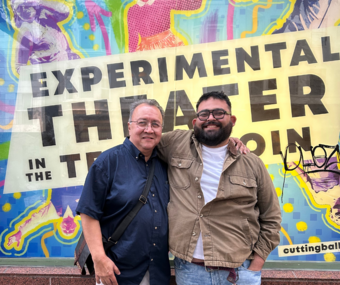


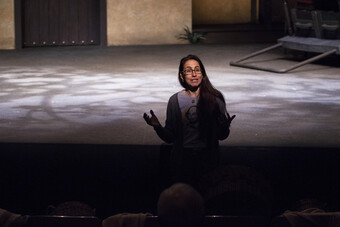


Comments
The article is just the start of the conversation—we want to know what you think about this subject, too! HowlRound is a space for knowledge-sharing, and we welcome spirited, thoughtful, and on-topic dialogue. Find our full comments policy here
Beautiful call to action.